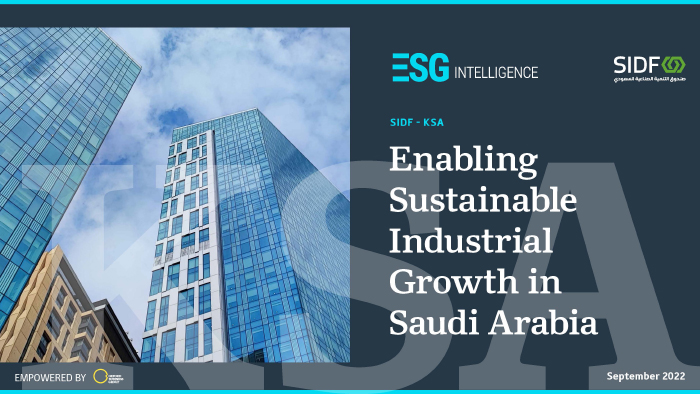A new environmental, social and governance (ESG) intelligence report, produced by Oxford Business Group (OBG) in partnership with the Saudi Industrial Development Fund (SIDF), explores the importance of sustainability in future industrial development in the Kingdom.
The report provides in-depth analysis of moves under way to integrate ESG principles into support mechanisms for the manufacturing, logistics, mining and renewable energy sectors in an easy-to-navigate and accessible format, complemented by key data and infographics.
These sectors have been identified as ripe for development, in line with the targets outlined in the Saudi Vision 2030, , the national roadmap for economic transformation, and the National Industrial Development and Logistics Programme, one of the core Vision Realisation Programmes.
The report also links to Saudi Arabia’s bid to achieve net-zero carbon emissions by 2060, tracking the measures that both public and private sector players are implementing in an effort to reduce their carbon footprints and incorporate sustainability policies into their growth plans.
Subscribers will find detailed coverage of efforts to incorporate ESG risks and opportunities into SIDF’s support mechanisms for businesses as they eye post-pandemic expansion.
The report looks closely at the key role that SIDF is playing in supporting Saudi companies on their ESG journey and driving broader industrial progress, while giving weight to sustainability, environmental protection and social well-being in its support programmes.
SIDF’s strategies in its hiring, training and lending policies, and their alignment with national objectives, such as Saudiisation, regional development and women’s empowerment, are other areas of focus.
The report includes opening remarks by Bandar Alkhorayef, Minister of Industry & Mineral Resources and Chairman of SIDF, in which he notes the growing importance of sustainability in the Kingdom.
“There has been significant interest within the Kingdom in developing ways of adopting sustainable principles that meet the needs of both local industry players and broader Saudi society, as well as align with the sustainable development principles established in Vision 2030, Alkhorayef said. “At the Ministry of Industry and Mineral Resources, we support organisations and companies by providing them with a platform for collaboration on environmental sustainability, social impact and corporate governance, as we recognise the positive impact that effective ESG strategies can have on Saudi industry, as well as on the broader society.”
The report also includes an interview with Ibrahim Almojel, CEO, SIDF, in which he explores a wide range of topics, including how the pandemic redirected the industrialisation debate in Saudi Arabia.
“First, the health crisis led to a shift in priorities. While the focus had been on boosting efficiency by leveraging global supply chains, today efforts are concentrated on building resilience. This can be achieved by increasing localisation, particularly in strategic areas that are relevant to the region’s prosperity,” Almojel said. “Second, long-standing trends like digitalisation are being accelerated as economies move towards a post-pandemic rebound. Technologies associated with the Fourth Industrial Revolution are being rolled out across sectors to boost overall competitiveness, and the emphasis on sustainability is greater than ever.”
Jana Treeck, OBG’s Managing Director for the Middle East, said advancements in Saudi Arabia’s industrial, mining, logistics and energy sectors indicated that the Kingdom’s economic and social transformation was gathering momentum.
“Saudi Arabia’s efforts to create a diverse and competitive economy, capable of generating sustainable, more inclusive growth in the future, are well on track,” Treeck said. “Our report shows that there is also a growing commitment among both the public and private sectors to put ESG principles at the centre of projects and policies, which will help companies achieve long-term value creation and deliver multiple, socio-economic benefits.”
This ESG intelligence report on Saudi Arabia forms part of a series of tailored studies that OBG is currently producing with its partners, alongside other highly relevant, go-to research tools, including a range of Future Readiness reports, and sector-specific Growth and Recovery Outlook articles and interviews.


COMMENTS